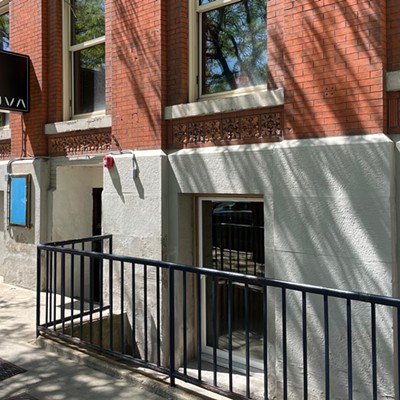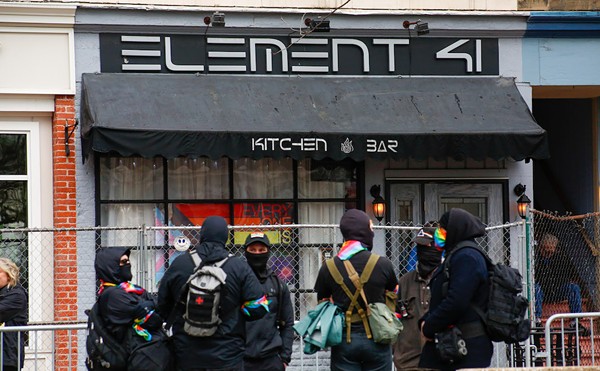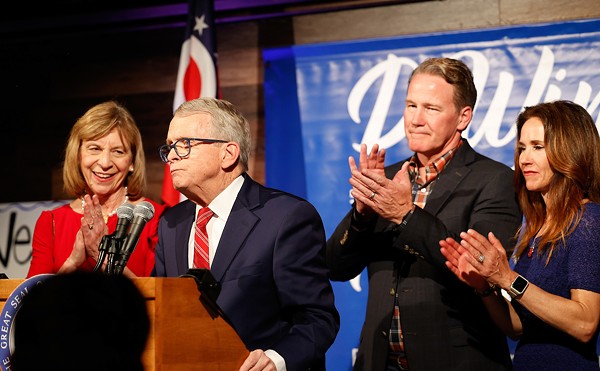During a traffic stop in Collinwood last year, Stephon Keith Moore tried to run over Cleveland policeman Martin Rudin. Rudin and his partner, Daniel Jopek, opened fire, killing the man. For the next eight months, they were paid a total of $61,068 to hang out in the police gym instead of working their normal shifts.
Last year, three teenage boys driving a stolen car eluded police for several blocks before crashing into a fence post. When officer Robert Taylor approached the car, the driver backed into him, trapping him against his patrol car. Taylor and officer Matthew Baeppler shot in defense, killing one boy in the car and injuring another. The two cops spent the next six months in the gym, for which they were paid a total of $45,157.
After a robbery suspect pointed a gun at them, officers Katherine Cruz and Andrew Harhay shot the man in the thigh and arm. They spent the next 10 months sitting in the gym instead of patrolling the 6th District and were paid a total of $72,297.
In all but one case, the officers were found to be justified in their use of force. (The city law department left Taylor's case up to a grand jury, but recommended that he not be indicted.) Yet the rulings came only after lengthy investigations, during which Cleveland paid the officers to do practically nothing.
The program that assigns cops to the gym following deadly-force situations arose in 1983 from the best of intentions. It was designed as a 90-day break that would give officers time to recover from the trauma while the incident was investigated. Several years ago, that respite was shortened to a minimum of 45 working days.
But an investigation by Scene reveals that, under Mayor Jane Campbell, stays in the gym have bloated to an average of more than 116 working days per officer. Some assignments have lasted as long as 215 working days. One officer -- Edward Lentz Jr. -- has been on gym duty since before Campbell took office a year and a half ago.
The cost to taxpayers has been considerable. Under Campbell, the city has spent at least $550,000 paying the salaries of gym officers. That figure doesn't include overtime paid to colleagues who must cover their shifts.
Cops, ostensibly the beneficiaries of the program, are fed up. They describe the assignment as being in "limbo," where they are "doing time without a parole date." In protest, one officer began showing up dressed in an inmate's striped uniform. Another circulated a flier in the Justice Center, calling for a class-action suit to end the practice.
Police and their advocates blame Campbell's law department, which has been achingly slow in completing investigations. They say Law Director Subodh Chandra and Chief Assistant Prosecutor Sanford Watson are too indecisive, too cautious, and too averse to controversy to move in a timely fashion.
Chandra and Watson make no apologies. They say that it's more important to be thorough than speedy and that the investigations take only as long as is necessary.
Yet that thoroughness carries a heavy price tag. Says one officer: "They're paying us a lot of money not to be policemen."
In the early 1980s, police departments nationwide started programs to help officers deal with the trauma of shooting someone in the line of duty.
Carolyn Tenerowicz, a neatly dressed psychologist who works as a stress consultant for the Department of Public Safety, was the architect of Cleveland's program.
In those days, there may have been 100 similar programs across the country, and most provided 90 days for an officer to recover, Tenerowicz says. "The 90-day period was an allotment for the case to be completely closed."
Officers were assigned to the gym, where they'd be out of the media spotlight. They were to exercise and meet with Tenerowicz once a week for counseling. "The officer has a chance to be a family member again, talk about the incident, and not have the pressure of the day-to-day responsibility of police work," she says.
Yet even the most avid bodybuilders can't lift weights eight hours a day, which gave officers plenty of downtime. "You show up, work out a couple hours, go home," says one officer. "They go to the bar, they cut their grass. It's all on city time."
Over the past two decades, many cities slashed or abandoned the 90-day program, Tenerowicz says. "Police departments began to feel it was not cost-effective, so they stopped giving their officers the luxury of recovering."
Perhaps because that "luxury" brought sticker shock.
On January 9, Michael Ciacchi died in a hail of bullets after a standoff with police. Four days later, eight officers involved in the incident began their gym duty.
They would remain there for the next four months. That's roughly 88 working days each -- or 704 for the group. The cost to taxpayers: more than $122,000.
Though it's difficult to gather precise figures due to vacations and holidays, under the Campbell administration, every officer has far exceeded the 45-day minimum. Among the longest stays:
Robert Taylor and Matthew Baeppler: about 134 and 133 working days, respectively.
Raymond Chipgus, 158.
Martin Rudin and Daniel Jopek, 180 each.
Earl Holcomb, 181. (One month after Holcomb was released, he was assigned to the gym again for an unrelated matter and stayed 68 more days.)
Andrew Harhay and Katherine Cruz, 215 each.
Edward Lentz Jr.: still assigned to the gym after more than 365 working days.
(The police department turned down Scene's request to interview officers. "We don't let officers interview on matters of policy," says spokeswoman Donna Bell.)
In fairness to Campbell, the trend began before she took office. Records provided by the Department of Public Safety only go back to August 2000 -- 16 months before Mayor Mike White's term ended. They show stays of up to 214 working days.
Yet the time spans have grown by an average of 27 days during Campbell's short tenure. (Scene's calculations considered only officers who have been released or who have a release date set.)
The length and indefinite duration of the assignments have created resentment. "They've made the gym punishment," says one cop. "Guys hate it in the gym."
Officers describe the facility as filthy, poorly lit, and cold, with black mold growing in the showers. It can be economically depressing as well. While assigned there, cops are forbidden to work part-time jobs, which drastically reduces their income.
"So if you got kids in Catholic school -- a lot of police officers do -- they work part-time to keep their kids in school, or they work for some place for years and years part-time, and all of a sudden, they didn't do anything wrong, and they can't do it anymore," says one cop.
"You're being financially punished for doing your job," says another officer.
The length of the investigations also feeds conspiracy theories and increases public perception that an officer acted improperly, says lawyer Patrick D'Angelo, who represents many cops. "When you have a case when an officer is doing his or her job in good faith, and somebody gets hurt . . . those officers don't need to be treated in the same fashion as somebody that's allegedly taking money or doing something like that."
Bob Beck, president of the local Patrolmen's Association, says long gym stays have "caused undue strain and stress to our police officers and their families."
Even Tenerowicz, the architect of the program, concedes that long, indefinite stays have the potential to increase an officer's anxiety instead of reducing it.
The police chief ultimately decides when officers leave gym duty, but it's been standard practice to wait until the city law department rules on the investigation.
The department is headed by Subodh Chandra, a passionate and intense man who previously prosecuted white-collar criminals for the U.S. Department of Justice.
He says that the most satisfying moment of his career came in a case involving a woman who at first appeared to be guilty of health-care fraud. After investigating, Chandra concluded that she was innocent.
He emerged with a life lesson: "If you do the extra effort, you'll get the right result."
But what Chandra regards as "extra effort," others see as indecisiveness, pandering, and foot-dragging.
"I think the decision-makers over there [in the law department] tend to be overly analytical, to the point of absurdity," says D'Angelo.
When shown the results of Scene's investigation, Chandra was dismissive, calling it "an interesting exercise in bean-counting." He argued loudly and angrily, contending that comparisons between the Campbell and White administrations don't hold weight.
"You're looking at individual numbers on individual cases and arbitrarily claiming that a certain number constitutes too long of an investigation," Chandra says. "We are respectfully suggesting to you that that's idiotic and does not constitute an understanding of how a criminal investigation is conducted."
Public Safety Director James Draper acknowledges that half a million dollars is a lot to spend, but adds that he doesn't want a "loose cannon" on the street. "I slept well, knowing that each officer had the attention they needed. If I had to double that figure . . . then so be it."
Yet Michael Barrett, a former Cleveland patrolman who is now a criminal justice professor at Ashland University, says deadly-force inquiries should be quick by nature. "It's not like a regular shooting, where the suspect disappears," he says. "The officer is required to participate."
Asked how long such an investigation should take, Barrett says, "I would think you should be able to come up with something within a month . . . unless it's a really unusual situation."
Major Craig Gilbride, of the Akron Police Department, was surprised that Cleveland officers are off the street for an average of 116 working days. "Wow! I know ours is nowhere near that," he says.
While Akron has "no set time limit," prosecutors usually make a decision within 60 to 90 days, Gilbride says. In the meantime, officers are put on leave or light duty, which may mean staffing an information desk or taking telephone reports.
It's a similar story in Columbus. Detective Bureau Commander Paul Denton says officers are often back on patrol in "a matter of days or weeks," if a preliminary investigation indicates that the shooting will be ruled justified.
Some of Cleveland's delays can be attributed to Chandra's late appointment. Campbell waited until April 2002 to tap him for the law director's job, and he didn't start work until a month later. It took additional time to hire Chief Assistant Prosecutor Sanford Watson, who joined the staff that October. They inherited a law department with a significant backlog of cases.
Chandra also notes that, during Campbell's term, there has been an unusual spate of deadly-force incidents, several of which involved extra legal research because officers were threatened with cars rather than guns.
But even with Chandra and Watson in place, officers have remained in the gym longer than they did under Mayor White.
On August 8, 2002, Jeffrey Hopkins, high on PCP, attacked officers Michael Schmitt and Donald Finau on Public Square. Hopkins wrested Schmitt's gun away and shot him in the face. Finau then shot the crazed man six times, killing him. Finau was assigned to the gym a month later.
It would have seemed an open-and-shut case for justified use of deadly force. And indeed, on February 6 of this year, the law department ruled it justified. Yet Finau remains in the gym nine months after being assigned there, compared to an average stay of four months under White. Finau is scheduled to return to his regular duty on June 16.
Critics of Campbell's law department say that it coddles special-interest groups and deliberately sits on controversial cases, quietly issuing its ruling months later, after the media has lost interest.
"It seems like it's pretty obvious that this administration doesn't want to rule on these things," says one officer. "I think the theory is out of sight, out of mind. If you wait long enough, people will forget."
Says another: "The longer you drag it out, the longer it's gonna die. You see a shooting happen today, you're not gonna remember it six months from now."
D'Angelo agrees: "I don't think [the law department's] going to say that we're not going to charge this officer because we're getting a lot of flak from some segment of the community, but the fact is that they take that into account."
He cites the case of Officer James Toomey.
Last June, Toomey and his wife heard noises outside their home. Toomey found 20-year-old Joseph Finley lying by the garage, holding a metal pole ["14 Shots," December 25, 2002].
According to authorities, Finley attacked Toomey with the metal pole, slashing his stomach and chest. Toomey responded with 14 shots, killing Finley.
Because Finley was of Cherokee and Seminole descent, Native Americans rallied to the cause. About 100 protesters gathered outside Toomey's home, carrying signs bearing photos of Finley in his coffin and the slogan, "This Should Never Have Happened."
The law department took more than seven months to issue a ruling, drawing complaints from both sides that it was being indecisive. Watson ultimately recommended that the case be sent to the grand jury, but added that Toomey shot in self-defense. Cuyahoga County prosecutors didn't even bother sending the case to the grand jury.
Watson admits that the department has been more open to listening to third parties. In the Toomey case, several people quoted by the media claimed that they had pertinent evidence. Watson chased every lead. The fact that none panned out doesn't shake his conviction that he did the right thing.
"If you're going to give people a fair opportunity to have input, that takes time," he says.
But Watson and Chandra agree that the main reason cases take so long is the obligation to be thorough. "There's an underlying fallacy behind the notion that quicker is better," Chandra says. "Thorough is better. Thorough takes time."
Chandra points to the probe of Officer Edward Lentz Jr.
In December 2001, shortly before Campbell took office, Lentz shot and wounded a 12-year-old boy who was driving a stolen car. Lentz claimed he fired after the car hit him and propelled him onto its roof, putting his life in danger. But after a yearlong investigation, prosecutors concluded that Lentz wasn't credible. There was no physical evidence, and several eyewitnesses contradicted his story.
"It was the thorough review that led to our ability to shatter any line of defense on his part," says Chandra.
Watson recommended that Lentz be charged with felonious assault. But the grand jury disagreed, instead charging him with a misdemeanor for allegedly lying in a written statement to investigators. The case has yet to go to trial.
No one is arguing that cops should be rushed back onto the streets. "I believe that there should be a time period of reassignment," says union president Beck. "I think it does the officer good."
The problem is the length of stays in the gym. "The city shouldn't be using it just to stash people while they're investigating the incident," says professor Barrett. "It's supposed to be for the officer, not [for] the city to hide them."
Police higher-ups acknowledge the problem. Deputy Chief Timothy Hennessy says the issue came to his attention when eight officers were assigned to the gym for the January shooting. "Having eight officers involved in one shooting makes the investigation more complex, and it also makes you realize that it's very expensive to have all those officers detailed to the gym at one time."
In early April, Hennessy met with the officers. "Many of them expressed a strong desire to return to regular duty," he says. They were released May 15, though the law department has yet to issue a ruling.
From now on, Hennessy says, officers will be allowed to return to work after 45 days -- even if the law department has yet to issue a ruling -- provided that they're cleared by Tenerowicz and two other experts. "We're gonna follow that guideline as close as we can."













